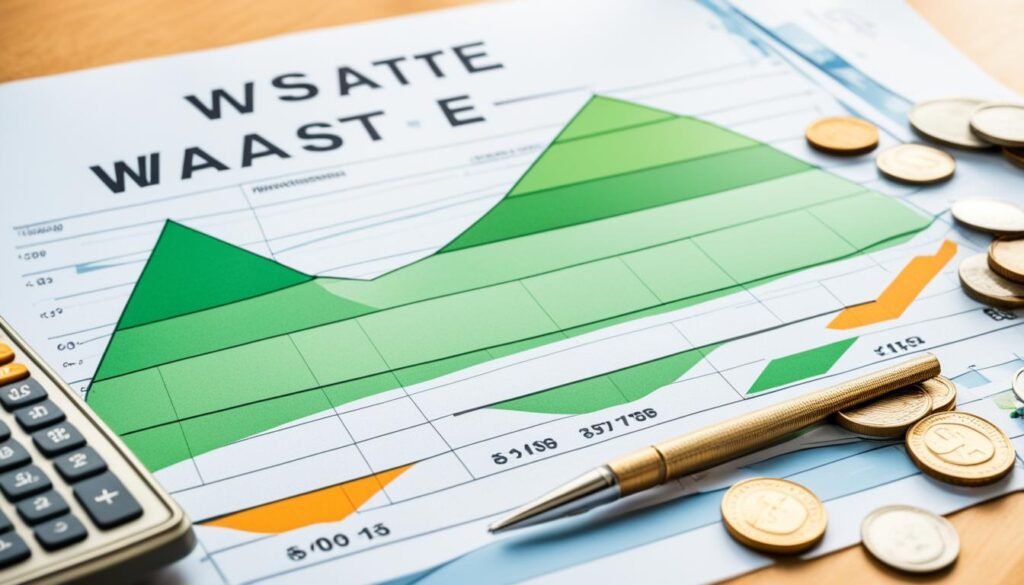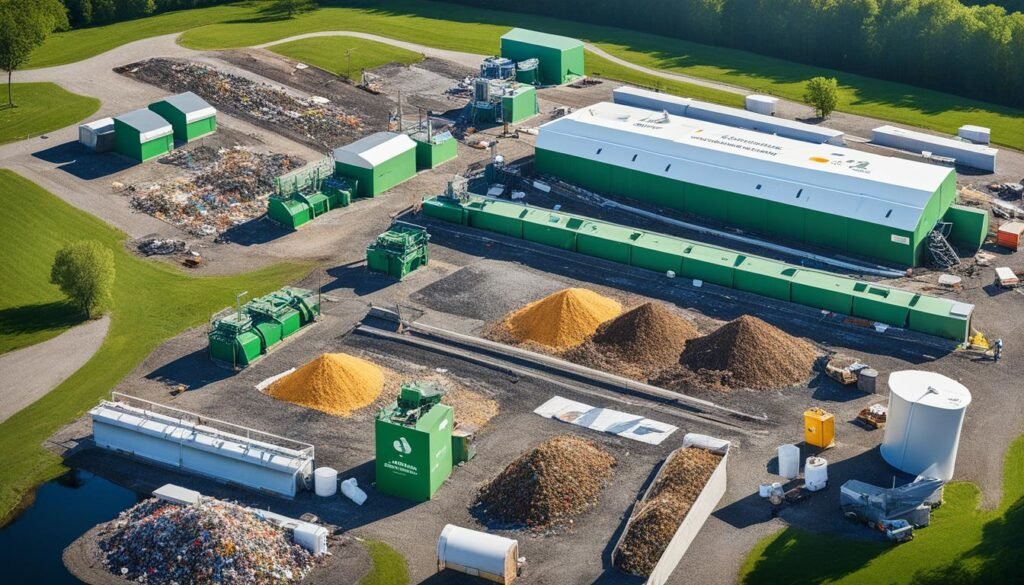Did you know that bad waste management leads to about $10 billion in losses every year in the US? Waste management is a big deal. It’s not just about getting rid of trash. It involves a lot of factors that affect its cost and how it impacts the environment.
Many things add to the cost of managing waste. These include the money spent on labor, equipment, moving trash, and following rules. But there are hidden costs too. Poor waste handling leads to pollution, health problems, and using up resources. These can cause big problems later on.
But, there is good news. We can manage waste in a way that’s better for the planet. This means making less waste, reusing more, and less harm to nature. Putting money into better equipment and new ideas can make waste management cheaper and more effective.
Key Takeaways:
- Improper waste management practices result in an estimated $10 billion economic loss annually in the United States.
- Labor costs, equipment costs, transportation costs, and regulatory compliance expenses contribute to the overall financial aspect of waste management.
- Hidden costs of improper waste management include environmental pollution, public health impacts, and resource depletion.
- Sustainable waste management solutions focus on minimizing waste generation, maximizing resource recovery, and reducing environmental impact.
- Investing in modern infrastructure and innovative technologies can enhance efficiency and reduce the financial burden of waste management.
The True Cost of Waste
Waste management costs involve more than just the price of collection and disposal. There are unseen costs too, like environmental pollution, public health issues, and the use of resources. These hidden costs can greatly affect our world.
It’s important to not only think about the immediate costs. We must also consider the long-term effects on the environment and society. This is the only way to truly understand waste’s cost.
Bad waste management can hurt nature, animals, and even people’s health. Cleaning up pollution can be very expensive. Also, wrongly disposed waste means we might run out of important resources, raising costs for everyone.
The effects on people’s health can be serious when waste is not handled right. Dirty air, water, and ground can cause breathing problems and diseases. These health issues can lead to expensive medical bills, making the cost of waste even higher.
Organizations should invest wisely in managing waste. Putting money into eco-friendly waste solutions can reduce the hidden costs. This is a smart move for the environment and the wallet.
Sustainable practices like recycling and composting make a big difference. They cut down on pollution and keep people healthy. Plus, they can save money in the long run. Turning waste into energy or other resources can even make money.
Thinking about the return on investment (ROI) is key for waste-related choices. Even though eco-friendly options might cost more at first, they can save much more money later. They lessen trash, use resources better, and protect our planet. This helps organizations save money and be more sustainable.
To make a better future, it’s crucial to fully understand waste’s true cost. Recognizing both the obvious and hidden costs helps make careful choices. These choices should support the environment and be financially smart too.

Next, let’s look at how businesses can embrace sustainable waste methods. This benefits both the environment and their finances.
Moving Towards Sustainable Solutions
To improve waste management, we need to start following practices that create less waste. We also need to focus on getting the most out of our resources while protecting the environment. Traditional methods might save money at first, but sustainable approaches give us long-lasting benefits. They help reduce our environmental impact, save resources, and keep us healthy.
By choosing sustainable waste strategies, we can secure a greener and more cost-efficient future. Investing in these practices can lower our impact on the environment and save money over time. Efforts like reducing waste, recycling more, and using renewable energy can greatly reduce costs, while also caring for our planet.
A big part of getting waste management right is using new technologies and better infrastructure. Waste-to-energy plants can turn our garbage into electricity, cutting down on fossil fuel use and lowering greenhouse gas emissions. Smart waste collection systems can also make trash pickup more efficient, reducing how much fuel is used and how much it costs.
Adopting green waste management methods is a chance for organizations to improve their image, lower expenses, and help make the world a better place.
Success in sustainable waste management means everyone needs to work together. This cooperation ensures we have a strong waste management system that includes different viewpoints, skills, and resources. It leads to sharing knowledge, coming up with new ideas, and finding the best ways to handle waste and save resources.
Case Study: XYZ Corporation
XYZ Corporation shows how sustainable waste management can save money. By focusing on reducing waste and recycling, they cut their waste handling costs by 30%. They also saved more than $100,000 every year just by recycling and using energy-efficient tech.
Their dedication to being eco-friendly improved their brand and attracted customers who care about the environment. This led to more sales and loyal customers, which helped their business grow.
| Key Benefits of Sustainable Waste Management | Key Recommendations |
|---|---|
|
|
By choosing sustainable waste management, companies not only help the planet but also see major financial benefits. These savings, along with the positive effects on the environment and society, make it a great choice for everyone involved.

Conclusion
Balancing the costs and sustainability in managing waste is key. It protects the environment and our health. Plus, it ensures future economic success.
We must think about the economy, the environment, and society. This way, we create a waste management plan that’s good for our wallets and the world.
Putting money into new infrastructure and innovation can save cash later. With the right policies and teamwork, we can make waste management better and sustainable.
This broad strategy lowers waste management costs and helps the planet. By joining forces, we protect the environment and public health. Together, we can make a brighter future for everyone.
FAQ
What does waste management involve?
What factors influence the economics of waste management?
What are the hidden costs associated with improper waste management practices?
What are sustainable waste management solutions?
How can investing in modern infrastructure and innovative technologies reduce waste management costs?
What role do government policies and regulations play in waste management?
Why is collaboration among stakeholders important in waste management?
What are the hidden costs associated with improper waste management practices?
How can sustainable waste management practices benefit organizations?
Why is it important to balance cost-effectiveness with sustainability in waste management?
What can organizations do to build a more sustainable waste management system?
Source Links
- https://www.edie.net/circular-economy-could-save-100bn-on-waste-management-costs-annually/
- https://www.linkedin.com/pulse/economics-waste-management-balancing-sustainability-chinmay-yajnik-vgzrf
- https://assets.publishing.service.gov.uk/media/5a78ca9d40f0b6324769a32a/pb13548-economic-principles-wr110613.pdf
